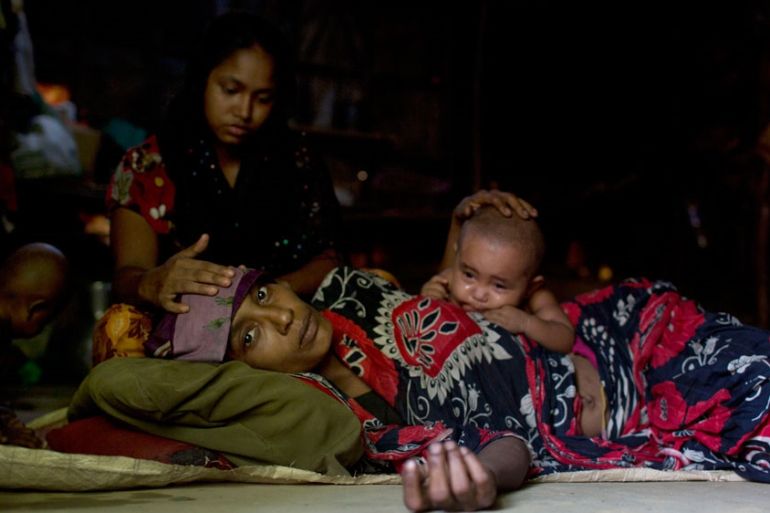Bangladesh pushes on with Rohingya island plan
Critics call plan to relocate Rohingya refugees from Myanmar to 6,000-acre island “terrible”.

Bangladesh is pushing ahead with a controversial plan to relocate tens of thousands of Rohingya refugees from Myanmar to a remote island, despite warnings it is uninhabitable and prone to flooding.
The government has set up a committee made up of state officials in the coastal districts, ordering authorities to help identify and relocate undocumented Myanmar nationals to Thengar Char in the Bay of Bengal.
Keep reading
list of 4 itemsConflict, climate, corruption drive Southeast Asia people trafficking: UN
Bodies of three Rohingya found as Indonesia ends rescue for capsized boat
How is renewed violence in Myanmar affecting the Rohingya?
“The committee will assist transferring both registered and unregistered refugees from Myanmar to Thengar Char near Hatiya island in Noakhali district,” according to an order issued by the Cabinet Division last week and posted online.
READ MORE: Rohingya camps in Bangladesh and Thailand, worlds apart
The relocation plan prompted outrage from Rohingya community leaders, while a UN agency said forced relocation would be “very complex and controversial”.
Hatiya is on the estuary of the River Meghna and a nine-hour journey away from camps where the Rohingya have taken shelter.
Some 232,000 Rohingya Muslims – both registered and unregistered – were already living in Bangladesh before more than 65,000 stateless Rohingya fleeing violence in neighbouring Myanmar’s western state of Rakhine began crossing into the country last October.
Most of those who fled to Bangladesh live in squalid conditions in refugee camps in Cox’s Bazar district, which borders Rakhine state and is Bangladesh’s biggest tourist resort.
![Rohingya Muslim men sit in their home at an unauthorised camp that houses Rohingya Muslim refugees who fled Myanmar during an ethnic strife in 1992 [Saurabh Das/AP]](/wp-content/uploads/2017/01/ef5fef163e1d41f2ab14e5a33b7f5e83_18.jpeg)
Bangladesh has also asked officials in the border districts to identify Myanmar nationals who have “illegally infiltrated” the country.
“It has to be assured by taking preventive measures that they (refugees) cannot spread out and mix with the locals,” read the order which was dated January 26.
“The identified refugees should be arrested or pushed back to the camps if they try to go out beyond the assigned boundary.”
Bangladesh first mooted the idea of relocating the refugees in 2015, despite allegations that the island was not ready for human habitation.
An official in the region criticised the idea, saying the 2,430-hectare island was “only accessible during winter and a haven for pirates”.
The authorities were planting trees in a bid to shore up land against high tides and flooding, but those efforts were at least a decade away from completion, the official added.
“It completely inundates during the monsoon,” the official told the AFP news agency, speaking on condition of anonymity.
“It’s a terrible idea to send someone to live there.”
There was no immediate comment from the Rohingya community leaders.
![Mohammad Rafique, a Rohingya Muslim from Myanmar, centre, begs a Bangladesh Coast Guard official not to send his family back to Myanmar at Shahporir Dwip in Taknaf, Bangladesh [AP]](/wp-content/uploads/2017/01/a6a5a8acc5de4ff6b9363bc923126266_18.jpeg)
![Rohingya from Myanmar who crossed over to Bangladesh, huddle in a room at an unregistered refugee camp in Teknaf, near Cox's Bazar [AP]](/wp-content/uploads/2017/01/442f90e220de431d95221adff7a5c516_18.jpeg)